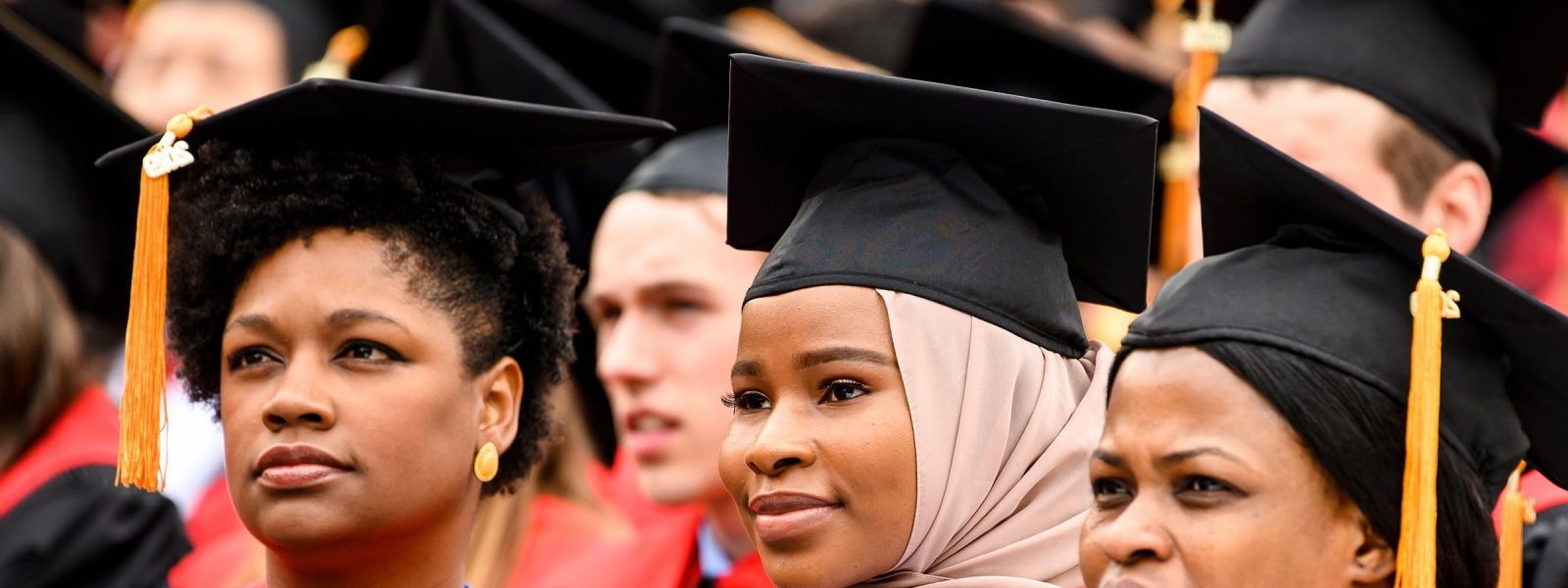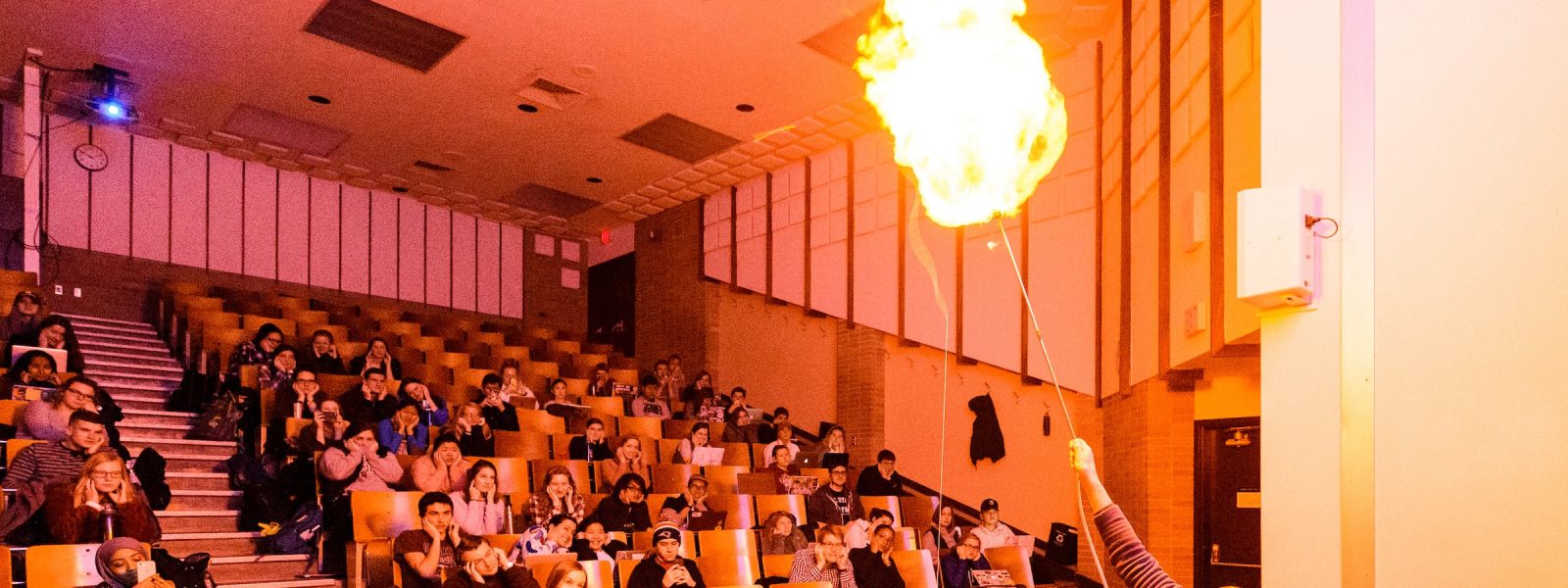Excellence in Teaching and Educational Achievement
Provide access to a world-class, affordable educational experience.

1. Strengthen educational outcomes, career development, and the college experience for all students.
Example initiatives:
First-Year Interest Groups
UW–Madison offers dozens of learning communities designed for incoming students. A First-Year Interest Group (FIG) enrolls students in a cluster of classes connected by a common theme with a small cohort of peers. The program allows students to explore a specialized academic interest and helps to ease their social transition to college.
Learning Support Services
Campus offers a wide array of learning and tutoring services to support academic success, including subject-specific services such as chemistry and physics tutoring to school/college centers.
SSTAR Lab
The Student Success Through Applied Research (SSTAR) Lab is researching innovative, sustainable ways to provide better financial aid to students. Early efforts include Bucky’s Tuition Promise, which fully covers four years of tuition for in-state undergraduates who meet income-level criteria. Partnering with the Office of Student Financial Aid, SSTAR is the only lab of its type at a university.
SuccessWorks
SuccessWorks is an industry-leading career center for students in the College of Letters & Science. Services include career-development courses and workshops, mock interviews, résumé review, coaching on job offers and salary negotiations, and alumni and employer networking events.
Transfer Engagement Center
The Transfer Engagement Center is a dedicated space for transfer students to help their transition to the UW. The center offers study spaces, community-building events, advising, and other support services. It also oversees BadgerCETE, a student-led weekly discussion section designed to connect new transfer students and provide leadership training.

2. Expand access to a UW–Madison education, leveraging new modes of delivery to engage with students throughout their lives.
Example initiatives:
Bucky’s Tuition Promise
Established in 2018, Bucky’s Tuition Promise is a commitment to Wisconsin’s students. The program covers four years of tuition and segregated fees for incoming freshmen (and two years for transfer students) whose family’s household income is $60,000 or less. Bucky’s Tuition Promise is currently providing tuition support to nearly 3,500 Wisconsin students.
South Madison Partnership Expansion
The UW South Madison Partnership (UWSMP) connects the university to the South Madison community. Located in Villager Mall, the space welcomes more than 1,300 visitors a month and records 83 hours of use each week. A variety of campus and community partners host meetings, events, and programming in the space spanning the areas of health, law, and education. Partners like the UW Odyssey Project, the Neighborhood Law Clinic and the Wisconsin Alzheimer’s Disease Research Center have been involved since the initiative’s start and others, like the Richard Dilley Tax Center, are new this year. Initially opened in 2015, UWSMP moved to an expanded space to increase its capacity in 2020.
Online Learning Initiative
The UW is committed to enhancing and scaling online learning, which will increase flexibility for traditional students and expand opportunities for nontraditional students. The centralized Online Learning Initiative is offering support to instructors developing online courses, while the Department of Continuing Studies is expanding its professional programs and offering hundreds of classes for adult learners. In addition, the university is preparing to offer its first fully online undergraduate degree program.
PEOPLE Program
The University of Wisconsin–Madison’s Precollege Enrichment Opportunity Program for Learning Excellence, also known as PEOPLE, started in 1999 with 66 high school students from Milwaukee. PEOPLE has grown to more than 1,000 students in the pipeline ranging from eighth graders to college seniors. We prepare Wisconsin secondary students to succeed in the UW System with an emphasis on enrollment at UW–Madison. The program has two units — one for precollege scholars and one for college scholars. The PEOPLE Scholars who are admitted and enroll at UW–Madison are eligible for a four-year tuition scholarship.

3. Expand educational programming in areas of high student demand, while maintaining the broad-based strength of our educational enterprise.
Example initiatives:
School of Computer, Data and Information Sciences
The UW created the School of Computer, Data and Information Sciences in the College of Letters & Science to strengthen research and education on campus, prepare graduates to fill new kinds of jobs, and support the state’s entrepreneurs. In September 2021, CDIS announced a campaign to raise $225 million in private support to fund a new building scheduled to open at the end of 2024. The university is investing heavily in these fields to meet growing student demand and to stay ahead of emerging technologies.
Growth of Online Master’s Degrees
New master’s degree programs at the UW are addressing training needs and certification requirements in high-growth job fields across the U.S. and at home in Wisconsin. Successful programs include: Online Pharmaceutical Sciences – Applied Drug Development and Psychoactive Investigation; Business’ accelerated program – Business Analytics; and Education’s accelerated program – MS in Secondary Education.
Center for the Humanities
The UW’s Center for the Humanities is an international leader in the public humanities, engaging the community on academic inquiries and serving as a hub for cross-disciplinary initiatives. The center offers fellowships, public lectures with visiting scholars, and research workshops. Its Great World Texts initiative connects UW faculty with high school teachers through the shared reading of a classic novel.
Data-Empowered Educational Practices
UW–Madison has invested in data-empowered educational practices. The focus on learning analytics provides actionable data that can improve teaching and learning. One key measure of success is the improvement in time to degree. UW students are taking less time to complete their degrees, setting a record on a key measure of student success. The average time-to-degree for 2019–20 bachelor’s degree recipients was 3.92 elapsed calendar years. This is the second consecutive year the figure has dropped below four calendar years.

4. Continue to grow faculty and staff teaching excellence.
Example initiatives:
Center for Teaching, Learning & Mentoring
A new center focused on the craft of teaching that offers professional development at all career stages, course design, and instructional consulting programs and services. The center’s focus on mentoring draws upon campus expertise to help instructors become effective mentors in all learning environments.
The Discussion Project
The UW School of Education created the Discussion Project to help faculty facilitate high-quality classroom conversations and prepare their students to participate in them. The training sessions strengthen campus’s capacity to create welcoming, engaging, and academically rigorous classroom environments.